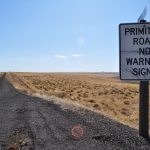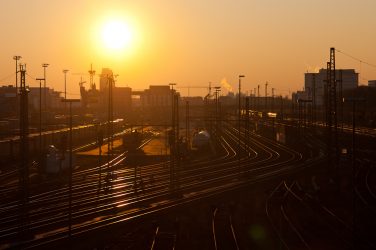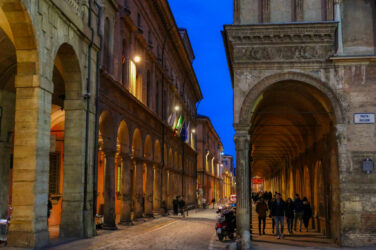E&M‘s Nicoletta Enria meets ticketless traveller Jeremy Stopes to talk about his cross-country adventures, borders and travelling without limits.
Ever felt inhibited in your travels by the necessity to book ahead and organising and purchasing your entire holiday? If you were ever wondering what it would be like to embark on adventures around the world without any limitations, E&M’s Nicoletta Enria speaks with ticketless traveller Jeremy Stopes about how travel ticketless and the independence and adventure that comes with it.

E&M: How did you come about the idea of ticketless travel and what exactly is it?
JS: To me, ticketless travel means going on open-ended trips with no travel or accommodation booked, travelling entirely or almost entirely by hitchhiking and paying for accommodation rarely or never. Generally ,the main goal is a feeling of complete independence and adventure. It might seem paradoxical to suggest that hitchhiking gives you independence since you are, of course, totally dependent on others, but nevertheless ,I think the fact that you completely control when your journey starts and ends outweighs the fact that you don’t control the pace. Generally ,hitchhikers also travel with a tent, a stove and food for a few days so the notion of independence also refers to the fact that at any given moment you are totally capable of looking after yourself without any hotels, restaurants or shops.
The actual phrase “ticketless travels” was inspired by George Bernard Shaw’s preface to the book The Autobiography of a Super-Tramp by W. H. Davies in which he writes
Why had I not the luck, at the outset of my career, to meet that tramp who came to Mr Davies, like Evangelist to Christian, on the first day of his American pilgrim’s progress, and saved him on the very brink of looking for a job, by bidding him to take no thought for the morrow; to ask and it should be given to him; to knock and it should be opened to him; and to free himself from the middle-class assumption that only through taking a ticket can one take a train.
E&M: How far have you travelled with ticketless travels?
JS: I worked this out once… Hard to get an exact figure but it’s in the region of 25,000 miles. Most of that is made up by a trip from London to Cape Town and another from Berlin to India. I also covered a lot of distance around continental Europe a few years back.
E&M: What were your biggest challenges?
JS: Learning not to be afraid. This includes learning to trust people and also learning to count your blessings. For example if no car has stopped for hours and I’m running out of food I’ll consider it a blessing that I have plenty of water left and there’s a nice wood nearby to camp in.
E&M: Have you noticed any differences in travelling through different European countries?
JS: Absolutely. The extent to which people are willing to pick up hitchhikers and offer them extra help along the way varies considerably between countries. I actually take this to be something of a litmus test for the country; if people are unwilling to pick up hitchhikers they must either be selfish, scared, or both. The differences can be stark, if you ever try to cross Italy from the east (which I don’t recommend) then don’t leave Slovenia until you get a good long lift, Slovenians are your last chance of getting any distance in Italy because the Italians certainly won’t help!

E&M: In light of the refugee crisis, how have you found crossing European borders and what are your views on European mobility?
JS: I hitchhiked the ferry from Calais to Dover this spring, so before the crisis reached its recent peak but while it was already certainly well underway. It was a tough gig; we waited for a long time and met with a fair bit of hassle from local police and port security as well as a very closed and unhelpful response from passing motorists. I was with two friends one of whom is of Pakistani origin (British born). When in the end we were offered one seat in someone’s van we sent him packing first and waited on as a pair; I wouldn’t fancy his chances alone.
I am yet to experience the new border checks that have been implemented in various places in Europe. To be honest I don’t think they would have a huge impact on me. I’ve crossed several borders where my presence as a pedestrian has not been very appreciated but ultimately the right passport and visa still gets you through.
E&M: What have you noticed about different reactions you have gotten in different European countries to your ticketless travels?
JS: To be honest I’ve become quite impervious to people’s reaction to me in the sense that the stream of cars that pass by staring or glaring or just not caring don’t affect me at all. The reactions of the individuals who eventually pick me up tends be consistently friendly and intrigued. Likewise if I need to knock on someone’s door to ask for water I find I get a good response everywhere.
E&M: In an increasingly hostile Europe where crossing borders is somewhat of a bone of contention, especially in the light of the Paris terrorist attacks and the terrorist threat, what do you see as the future of ticketless travels?
JS: I’ve crossed tense borders before. I crossed from Greece to Turkey when the army were having a standoff. I raised eyebrows crossing from Kyrgyzstan to China and from Tibet to Nepal. Entering and then registering in Sudan was tricky too. In the last few decades the number of places which are hard to get visas for, borders that are closed, or rules that allow entry to a country only by aeroplane (e.g. Myanmar until very recently) have increased. It is perhaps not a coincidence that, as travel has become faster and faster, the number of political barriers to overland travel has increased. The obstacles I faced travelling to India from Europe were very different from the ones faced by the hippies of the 60s who made the same journey. Unfortunately, the change is tending to make true ticketless travel harder. To get to India I had to apply in advance from my home country for both Russia and China visas (and state a 30 day period when I would be in Russia); I also had to pay for a guided tour through Tibet in order to enter and leave legally (people have been known to do it illegally too but since the rioting of 2008 this has become all but impossible). The reality is that there are only a precious few long overland routes that are remotely feasible these days, and even fewer if you are unwilling to make a careful plan in advance. I abhor careful plans since they restrict the possibility of adventure. As for travelling within Europe I think we’re a long way off restricted travel for EU passport holders, or at least for Western European passport holders; having to queue up and go through border control is really not that big a deal.

E&M: In an increasingly hostile Europe, where crossing borders is somewhat of a bone of contention, especially in the light of the Paris terrorist attacks and the terrorist threat, what do you see as the future of ticketless travels?
JS: I’ve crossed tense borders before. I crossed from Greece to Turkey when the army were having a standoff. I raised eyebrows crossing from Kyrgyzstan to China and from Tibet to Nepal. Entering and then registering in Sudan was tricky too. In the last few decades the number of places which are hard to get visas for, borders that are closed, or rules that allow entry to a country only by aeroplane (e.g. Myanmar until very recently) have increased. It is perhaps not a coincidence that, as travel has become faster and faster, the number of political barriers to overland travel has increased. The obstacles I faced travelling to India from Europe were very different from the ones faced by the hippies of the 60s who made the same journey. Unfortunately, the change is tending to make true ticketless travel harder. To get to India I had to apply in advance from my home country for both Russia and China visas (and state a 30 day period when I would be in Russia); I also had to pay for a guided tour through Tibet in order to enter and leave legally (people have been known to do it illegally too but since the rioting of 2008 this has become all but impossible). The reality is that there are only a precious few long overland routes that are remotely feasible these days, and even fewer if you are unwilling to make a careful plan in advance. I abhor careful plans since they restrict the possibility of adventure. As for travelling within Europe I think we’re a long way off restricted travel for EU passport holders, or at least for Western European passport holders; having to queue up and go through border control is really not that big a deal.
E&M: On a more positive note, what are the most memorable experiences of your travels?
JS: So many to choose from! Overall my travels in Africa gave me the most lasting memories. In particular Ethiopia and Sudan were incredible countries to visit which I would highly recommend. I wrote an account on my blog of what happened when me and my travelling companion went off the beaten track in Sudan.
E&M: Do you have anything else to tell our Europe & Me readers?
JS: Yes, there’s nothing stopping you from going on a trip like this. A lot of people claim they would like to travel in this way but then blame external factors for stopping them. The reality is you can do it with *very* little money, with basic equipment and with no experience. Some women believe it’s too dangerous for them to do alone but there are endless inspiring accounts online of solo female hitchhikers who’ve been all over the world. Yes it’s daunting and yes you will feel frightened and uncomfortable in the beginning but you’ve got to break eggs to make an omelette!
 About the interviewee
About the interviewee
Jeremy S- was born and raised in Manchester, England. He studied Philosophy and Russian at Bristol University where he learned very little. In recent years he has been avoiding paid work like the plague and trying to examine everything that was conditioned into him through his youth so he can burn it and fire its ashes into space. His writing occurs sporadically as a way to clarify his thoughts and he rarely seeks to publish it. He considers the values of specialisation and productivity to have been foisted upon us by the needs of capital and as such seeks neither in his own life. His main interests are personal development through mindfulness, emotional intelligence and consciously examined ways of relating to others and he is passionate about co-creating community events of learning and celebration which exist outside of the entertainer-consumer model.
Cover photo: Kate Ter Haar (Flickr) Licence: CC BY 2.0










